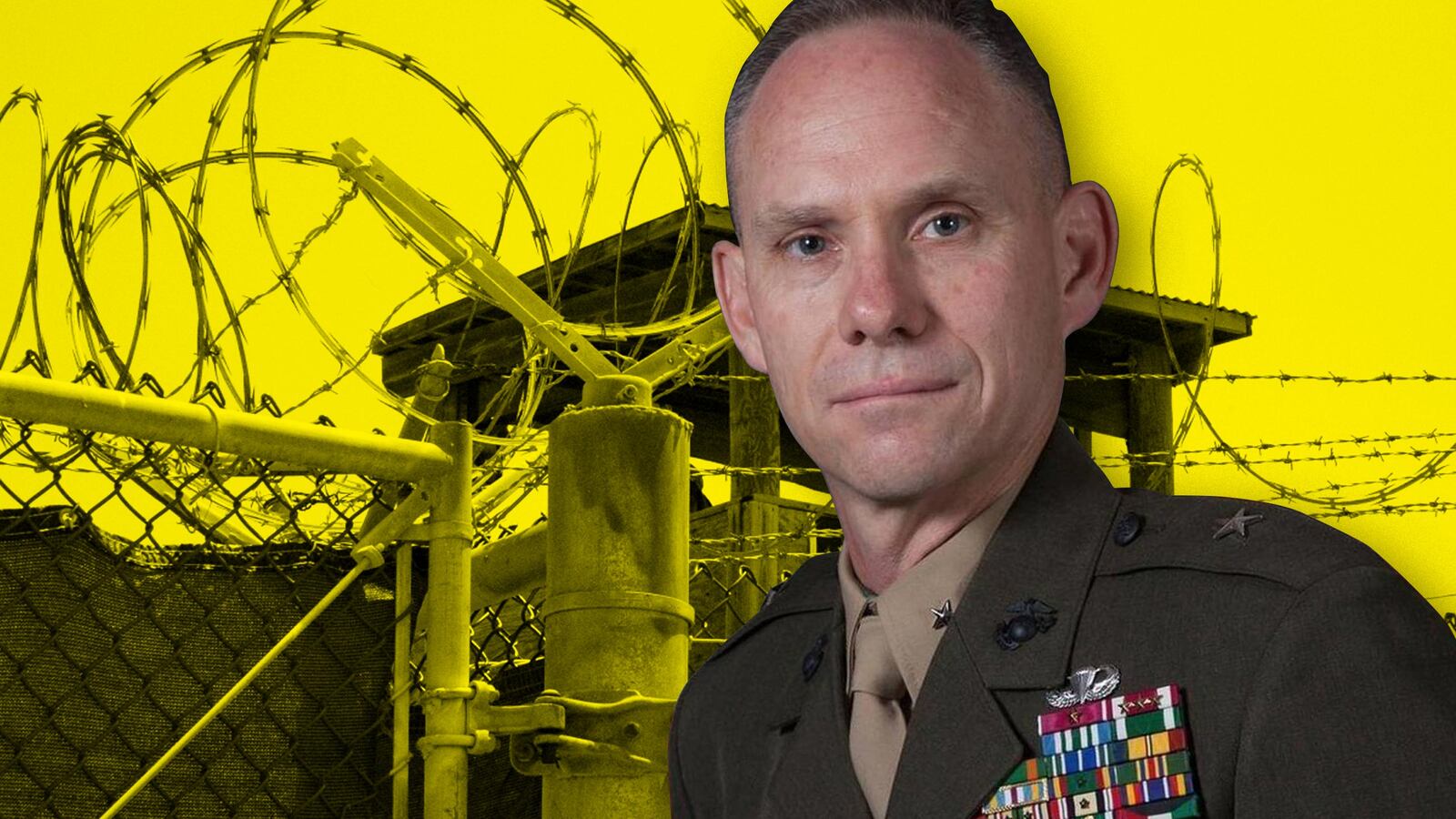A Guantanamo Bay judge was correct “in law and in fact” to convict a Marine general who objected to government spying on a military tribunal defense team, the head of the military commissions ruled Tuesday.
An attorney for Brigadier General John Baker told The Daily Beast that Commissions Convening Authority Harvey Rishikof was “plainly wrong” and his team is exploring their next legal steps to vindicate Baker.
In what amounted to a face-saving climbdown for a military commissions process embarrassed by Baker’s conviction, Rishikof ruled that Baker will not have to pay a $1,000 fine ordered by the conviction judge, Air Force Colonel Vance Spath. Nor will Baker have to complete his 21-day confinement at his Guantanamo quarters.
That’s a moot point, however: today marks the final day of the sentence, and Baker has been freed since November 3, when Rishikof set him free pending his now-completed review.
Baker is out of confinement but not out of the woods. Rishikof has sent Baker’s defiance to Pentagon, Navy and Marine Corps’ legal-counsel offices for an administrative ethics review, the Commissions office said in a statement.
In other words, Baker may still face punishment for defying Spath on an issue central to the question – still unresolved after 16 years – of whether the military tribunals for accused terrorists can dispense justice.
The extraordinary episode arose after the defense team for the accused U.S.S. Cole bomber, Abd al-Rahim al-Nashiri, quit the death-penalty case after discovering classified and still-undisclosed indications that the government was listening in on their communications. It was not the first time – nor even the second – that Guantanamo attorneys have learned their internal discussions were not exempt from surveillance, something long barred from civilian trials.
Those resignations meant a high-profile death-penalty case is without attorneys experienced (“learned counsel”) in death-penalty cases. Though Nashiri’s case has not reached the trial phase yet, to convict him without such attorneys would immediately cause the legitimacy of the government’s desired outcome to be thrown in doubt. Faced with a crisis, Spath ordered the attorneys, two of whom are Defense Department civilians, back to work. They refused.
Baker, the Marine general, is the chief defense counsel in the commissions process and backed the defense attorneys’ refusal to work. He traveled to Guantanamo for a dramatic October 31 showdown with Spath, whom he outranks. Spath refused to let Baker speak at the hearing and convicted him of contempt.
The process shocked observers and rattled Guantanamo defense attorneys. Lawyers for Baker immediately turned to the federal courts to free him. A reluctant Judge Royce Lamberth of the Washington, D.C. district court punted to Rishikof, though Lamberth left himself the option of subsequent intervention. Baker’s lawyers may go back to Lamberth if the Pentagon will not overturn Rishikof, one of them told The Daily Beast.
“While we are very pleased that the Convening Authority negated the remainder of the sentence of confinement and overturned the fine that had been imposed, we think the Convening Authority was plainly wrong in concluding that the military judge had the authority to hold General Baker in contempt in the first place,” said Barry Pollack, an attorney for Baker.
“The contempt finding should be reversed. We are reviewing whether there is a further avenue within the military that should be pursued to challenge the erroneous contempt finding or whether to return to Judge Lamberth to ask him to overturn the contempt finding.”
Late on Tuesday, Rishikof attempted to split the difference between Spath and Baker, both of whom remain part of the commissions process.
Rishikof has no power over the entirely separate military command that runs the detention facility at Guantanamo, where 41 men remained detained. But he will recommend what he called a “‘clean’ facility” be provided as a mechanism for “continued assurances and confidence that attorney-client meeting spaces are not subject to monitoring, as the commission proceeds.”
It’s the closest Rishikof has come in his nearly nine-month tenure to acknowledging the danger the government’s seeming inability to allow tribunal defense attorneys to communicate amongst themselves poses to the entire commissions enterprise.
It comes in contrast to Spath. As the commissions noted in its statement on Tuesday, the Air Force colonel had said in his hearing convicting Baker that “there wasn't any basis to find there had been an intrusion into attorney-client communications between this accused and this defense team.”
And in another sign that Rishikof isn’t letting Spath off the hook, Rishikof believes the “declassification of relevant documents concerning this matter needs to be expedited to ensure the now-classified analysis can be shared with the appropriate parties to reinforce the integrity of the process,” the commissions said in its statement.






